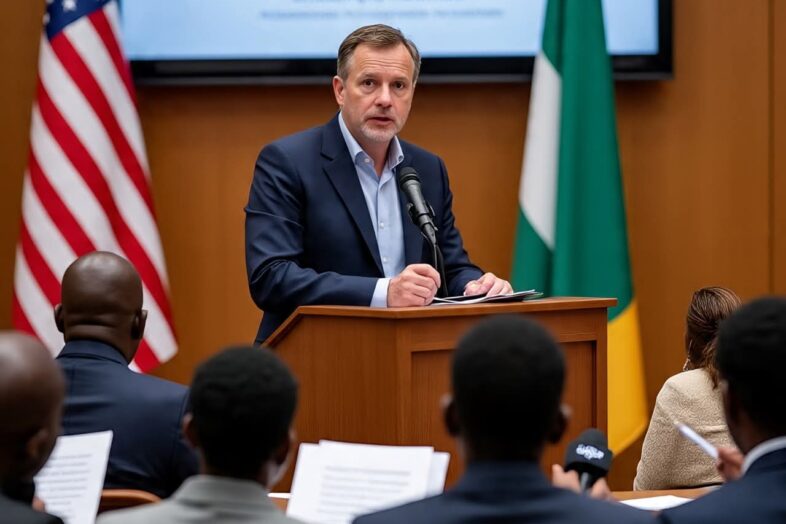
Abuja, Nigeria – The United States Mission in Nigeria on Friday moved to quell growing apprehension and speculation surrounding its recent decision to significantly reduce visa validity for Nigerian citizens. The Mission categorically stated that the policy change, which sees non-immigrant visas for Nigerians cut from five years to a mere three months, is not a reciprocal action to any Nigerian government policy, nor is it linked to Nigeria’s stance on accepting deportees from Venezuela, its e-visa policies, or its affiliations with the BRICS economic bloc.
The clarification comes after a report by PREMIUM TIMES earlier in the week announced the new visa regime, initially suggesting reciprocity as the rationale. However, in a detailed post on X (formerly Twitter), the US Embassy asserted that the reduction is “a part of an ongoing global review of the use of US visas by other countries using technical and security benchmarks to safeguard US immigration systems.”
This comprehensive global review, the embassy explained, aims to reinforce the integrity of the US immigration system by evaluating various criteria that partner nations are expected to meet. These critical benchmarks include:
- Secure Travel Documents: Ensuring countries issue highly secure travel documents with rigorously verified traveler identities, thereby minimizing the risk of identity fraud and illicit travel.
- Visa Overstay Management: Implementing robust measures to effectively limit the number of individuals who overstay their visas in the United States, a critical factor in maintaining immigration control.
- Information Sharing: The consistent and timely sharing of relevant security and/or criminal record information with US authorities, essential for protecting public safety and national security interests.
“We value our longstanding partnership with Nigeria and remain committed to working closely with the Nigerian public and government officials to help them meet those criteria and benchmarks, thereby ensuring safe, lawful, and mutually beneficial travel between our nations,” the embassy reiterated, emphasizing its desire for continued cooperation.
Nigeria’s Pushback and Economic Priorities
The US action had previously drawn strong reactions from Nigeria, with various officials expressing disapproval and challenging the perceived justifications. The Nigerian presidency had, in an earlier statement, dismissed the initial claim of reciprocity, arguing that it did not accurately reflect Nigeria’s existing visa policy towards US citizens.
Adding a different dimension to the debate, Nigeria’s Minister of Foreign Affairs, Yusuf Tuggar, during a one-on-one interview on Channels Television’s “Politics Today” on Thursday, had directly linked the new US visa policy to Nigeria’s firm rejection of Venezuelan deportees from the United States. Minister Tuggar was unequivocal in his stance, highlighting Nigeria’s own significant social and economic challenges.
“It will be difficult for a country like Nigeria to accept Venezuelan prisoners into Nigeria. We have enough problems of our own; we cannot accept Venezuelan deportees to Nigeria, for crying out loud,” he stated, underscoring the demographic pressure of over 230 million people within Nigeria’s borders. He further cautioned against the potential public backlash if Nigeria were to acquiesce to such a demand: “You will be the same people that would castigate us if we acquiesce to accepting Venezuelans from US prisons to be brought in.”
Instead of accepting deportees, Minister Tuggar articulated Nigeria’s strategic focus on fostering robust economic partnerships with the US, particularly in areas of shared interest and benefit. “We’re looking to do deals with the US,” he affirmed, pointing to Nigeria’s vast reserves of natural gas, critical minerals, and rare earths – resources deemed vital to American technology companies and global supply chains.
Impact and The Path Forward
The US Mission’s latest clarification aims to provide a clearer understanding of the rationale behind the policy shift. While the reduction in visa validity for most Nigerian non-immigrant applicants to a three-month, single-entry standard poses new challenges for Nigerian travelers, the US Embassy stressed that it is engaging actively with Nigerian government officials to address any outstanding issues and assist Nigeria in meeting these international best practices. Travelers are also urged to ensure their documents are authentic and to adhere strictly to visa terms.
The situation has created considerable anxiety among Nigerians planning to travel to the US for education, business, tourism, or family visits. The abrupt change and the initial conflicting explanations from both sides had fueled uncertainty. However, with the US Mission’s transparent communication on the underlying global review and security benchmarks, the immediate focus for Nigerian authorities is to intensify efforts in meeting these criteria.
This development highlights the dynamic nature of international visa policies and the growing global emphasis on shared security protocols and data integrity. As both nations continue their diplomatic engagement, the imperative remains to ensure that travel between Nigeria and the United States continues to be safe, lawful, and mutually beneficial for all citizens.









Alyce
Good shout.